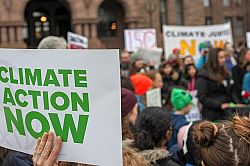

The power used by the meat and dairy industries in both EU and US are apparently blocking the development of greener alternatives needed to tackle the climate crisis.
Analysis suggests that funding is to blame, with farmers receiving around 1000 times more public funding than plant-based and cultivated meat production.
The study, which was published in the journal 'One Earth', analysed the major EU and US agricultural policies from 2014 to 2020. It found the amount of public money spent on plant-based alternatives was just $42m (£33m) – 0.1% of the £35bn spent on meat and dairy. It also showed that almost all dietary guidelines avoided highlighting the environmental impact of meat production.
Author of the research, Professor Eric Lambin of Stamford University stated: "The power of the animal farming sector, both in the US and in Europe, and the political influence they have is just gigantic."
"We found that the amazing obstacles to the up-scaling of the alternative technologies relates to public policies that still massively fund the incumbent system, when we know it’s really part of the problem in terms of climate change, biodiversity loss and some health issues."
Research suggests that cutting the meat consumption in rich countries is vital in tackling the climate crisis, with livestock production contributing to 15% of global greenhouse emission. Cutting meat and dairy consumption also vastly reduces pollution, land and water use, and the destruction of forests, making it one of the biggest ways to cut down on pollution.
Tackling the problem would require a change in governmental policies to price meat products based on the environmental costs, potentially via taxation, as well as increasing research on alternatives and better informing consumers on the environmental costs of what they consume.
The results of the study aren't a recent revelation, though, with Boston Consulting Group's 2022 report also concluding that introducing plant-based meat as an alternative is by far the most effective climate investment we can make as a global community. Begging the question of when enough pressure will be added to enact policy changes in support of our environment.
For more information on this subject, see: